July 2019
Toe Stretching Can Help Strengthen the Feet
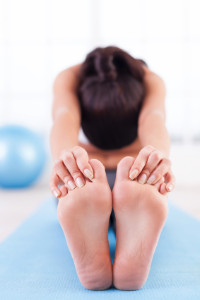 The toes play an important role in maintaining balance in the body. It is natural for the toes to turn upward, and this may be a result of wearing shoes that are too tight. If these types of shoes are frequently worn, the muscles in the toes can become tight, and may not return to their normal length. When the toes have adequate room to move freely, specific foot conditions may be prevented that can include athlete’s foot, hammertoe, and corns. Research has shown that it is beneficial to frequently stretch the toes, and this can be accomplished in a variety of ways. An effective toe stretch happens when the toes are bent downward which stretches the top of the foot. Additionally, it feels good to pull the toes apart, and this may temporarily create space in between the toes. If you would like to learn about the benefits of stretching your toes, please consult with a podiatrist
The toes play an important role in maintaining balance in the body. It is natural for the toes to turn upward, and this may be a result of wearing shoes that are too tight. If these types of shoes are frequently worn, the muscles in the toes can become tight, and may not return to their normal length. When the toes have adequate room to move freely, specific foot conditions may be prevented that can include athlete’s foot, hammertoe, and corns. Research has shown that it is beneficial to frequently stretch the toes, and this can be accomplished in a variety of ways. An effective toe stretch happens when the toes are bent downward which stretches the top of the foot. Additionally, it feels good to pull the toes apart, and this may temporarily create space in between the toes. If you would like to learn about the benefits of stretching your toes, please consult with a podiatrist
Stretching the feet is a great way to prevent injuries. If you have any concerns with your feet consult with Dr. Lee R. Stein from Lake Shore Foot & Ankle, PC. Our doctor will assess your condition and provide you with quality foot and ankle treatment.
Stretching the Feet
Stretching the muscles in the foot is an important part in any physical activity. Feet that are tight can lead to less flexibility and make you more prone to injury. One of the most common forms of foot pain, plantar fasciitis, can be stretched out to help ease the pain. Stretching can not only ease pain from plantar fasciitis but also prevent it as well. However, it is important to see a podiatrist first if stretching is right for you. Podiatrists can also recommend other ways to stretch your feet. Once you know whether stretching is right for you, here are some excellent stretches you can do.
- Using a foam roller or any cylindrical object (a water bottle or soda can will do), roll the object under your foot back and forth. You should also exert pressure on the object. Be sure to do this to both feet for a minute. Do this exercise three times each.
- Similar to the previous one, take a ball, such as a tennis ball, and roll it under your foot while seated and exert pressure on it.
- Grab a resistance band or towel and take a seat. If you are using a towel, fold it length wise. Next put either one between the ball of your foot and heel and pull with both hands on each side towards you. Hold this for 15 seconds and then switch feet. Do this three times for each foot.
- Finally hold your big toe while crossing one leg over the other. Pull the toe towards you and hold for 15 seconds. Once again do this three times per foot.
It is best to go easy when first stretching your foot and work your way up. If your foot starts hurting, stop exercising and ice and rest the foot. It is advised to then see a podiatrist for help.
If you have any questions, please feel free to contact one of our offices located in Chicago, Highland Park, and Uptown, IL . We offer the newest diagnostic and treatment technologies for all your foot care needs.
Read more about How to Stretch Your FeetBeing Overweight Can Hurt Your Feet
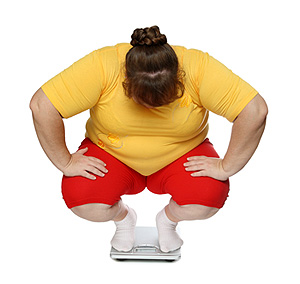 Since your feet feel the pressure of most of your body weight, being overweight can cause a variety of foot problems. Extra weight tends to bring the knees together, putting stress on the insides of the feet and arches. There are also several specific conditions that are known to be affiliated with additional weight. Gout causes severe pain in the big toe. It begins with an accumulation of uric acid in the body, which is more common for overweight individuals. You are also more likely to develop diabetes, which reduces blood flow to the feet. When you accumulate too much plaque in the arteries, you could develop peripheral arterial disease, which reduces blood flow to the feet as well. Losing weight is a practical way to avoid foot and ankle complications. If you feel that your weight may be affecting your feet, it is recommended that you consult with a podiatrist.
Since your feet feel the pressure of most of your body weight, being overweight can cause a variety of foot problems. Extra weight tends to bring the knees together, putting stress on the insides of the feet and arches. There are also several specific conditions that are known to be affiliated with additional weight. Gout causes severe pain in the big toe. It begins with an accumulation of uric acid in the body, which is more common for overweight individuals. You are also more likely to develop diabetes, which reduces blood flow to the feet. When you accumulate too much plaque in the arteries, you could develop peripheral arterial disease, which reduces blood flow to the feet as well. Losing weight is a practical way to avoid foot and ankle complications. If you feel that your weight may be affecting your feet, it is recommended that you consult with a podiatrist.
Obesity has become very problematic at this point in time and can have extremely negative effects on the feet. If you’re an obese individual and are concerned about your feet, contact Dr. Lee R. Stein from Lake Shore Foot & Ankle, PC. Our doctor can provide the care you need to keep you pain-free and on your feet.
Obesity and Your Feet
Since your feet are what support your entire weight when standing, any additional weight can result in pain and swelling. Being overweight is one of the main contributors to foot complications.
Problems & Complications
Extra Weight – Even putting on just a few extra pounds could create serious complications for your feet. As your weight increases, your balance and body will shift, creating new stresses on your feet. This uneven weight distribution can cause pain, even while doing the simplest tasks, such as walking.
Diabetes – People who are overweight are at serious risk of developing type-2 diabetes, which has a drastic impact on the health of your feet. As you get older, your diabetes might worsen, which could lead to loss of feeling in your feet, sores, and bruises. You could also become more prone to various infections.
Plantar fasciitis – Pressure and stress that is placed on muscles, joints, and tendons can trigger plantar fasciitis, which is an inflammation of tissue that forms along the bottom of the foot.
If you have any questions please feel free to contact one of our offices located in Chicago, Highland Park, and Uptown, IL . We offer the newest diagnostic and treatment technologies for all your foot and ankle needs.
Gout Pain Can Be Managed
What Is the Purpose of the Achilles Tendon?
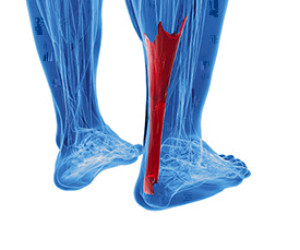 The largest tendon in the body is known as the Achilles tendon. Its function is to connect the heel bone to the calf muscles. Many tendons in the body are not flexible, and it is important to properly stretch this tendon before engaging in a sporting activity. If it should become irritated and inflamed, the result may be an Achilles tendon injury. The symptoms that are often associated with this type of injury can include tenderness, severe pain, discomfort, and the inability to bend the foot downward. If this tendon is not properly stretched, many people could tear their Achilles tendon if they start a new exercise regime, or increase the intensity considerably. There are numerous treatment options for this type of injury. If you feel you have injured your Achilles tendon, it is advised to consult with a podiatrist who can guide you toward the best treatment option.
The largest tendon in the body is known as the Achilles tendon. Its function is to connect the heel bone to the calf muscles. Many tendons in the body are not flexible, and it is important to properly stretch this tendon before engaging in a sporting activity. If it should become irritated and inflamed, the result may be an Achilles tendon injury. The symptoms that are often associated with this type of injury can include tenderness, severe pain, discomfort, and the inability to bend the foot downward. If this tendon is not properly stretched, many people could tear their Achilles tendon if they start a new exercise regime, or increase the intensity considerably. There are numerous treatment options for this type of injury. If you feel you have injured your Achilles tendon, it is advised to consult with a podiatrist who can guide you toward the best treatment option.
Achilles tendon injuries need immediate attention to avoid future complications. If you have any concerns, contact Dr. Lee R. Stein of Lake Shore Foot & Ankle, PC. Our doctor can provide the care you need to keep you pain-free and on your feet.
What Is the Achilles Tendon?
The Achilles tendon is a tendon that connects the lower leg muscles and calf to the heel of the foot. It is the strongest tendon in the human body and is essential for making movement possible. Because this tendon is such an integral part of the body, any injuries to it can create immense difficulties and should immediately be presented to a doctor.
What Are the Symptoms of an Achilles Tendon Injury?
There are various types of injuries that can affect the Achilles tendon. The two most common injuries are Achilles tendinitis and ruptures of the tendon.
Achilles Tendinitis Symptoms
- Inflammation
- Dull to severe pain
- Increased blood flow to the tendon
- Thickening of the tendon
Rupture Symptoms
- Extreme pain and swelling in the foot
- Total immobility
Treatment and Prevention
Achilles tendon injuries are diagnosed by a thorough physical evaluation, which can include an MRI. Treatment involves rest, physical therapy, and in some cases, surgery. However, various preventative measures can be taken to avoid these injuries, such as:
- Thorough stretching of the tendon before and after exercise
- Strengthening exercises like calf raises, squats, leg curls, leg extensions, leg raises, lunges, and leg presses
If you have any questions please feel free to contact one of our offices located in Chicago, Highland Park, and Uptown, IL . We offer the newest diagnostic tools and technology to treat your foot and ankle needs.
Children's Feet
For many kids, there isn’t a worry in the wo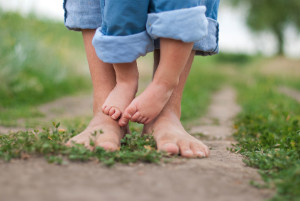 rld. To this end, children tend to neglect the impact their feet can take on a daily basis. Not being aware of any foot ailments as a child can lead to potential effects on the foot in adulthood. An untreated foot injury in childhood can also lead to undesirable personality effects. The growing child can become shy, introverted and avoid athletics and social events as a result. Some suggestions to help ensure that children's feet proceed towards normal development include making sure the child takes part in physical activities that exercise the feet, regularly taking the child to see a podiatrist to make sure the foot is developing properly and also to be aware of the child’s walking pattern to see if there are any potential foot problems. It is important to take your child to see a podiatrist if they show signs of having a foot ailment.
rld. To this end, children tend to neglect the impact their feet can take on a daily basis. Not being aware of any foot ailments as a child can lead to potential effects on the foot in adulthood. An untreated foot injury in childhood can also lead to undesirable personality effects. The growing child can become shy, introverted and avoid athletics and social events as a result. Some suggestions to help ensure that children's feet proceed towards normal development include making sure the child takes part in physical activities that exercise the feet, regularly taking the child to see a podiatrist to make sure the foot is developing properly and also to be aware of the child’s walking pattern to see if there are any potential foot problems. It is important to take your child to see a podiatrist if they show signs of having a foot ailment.
The health of a child’s feet is vital to their overall well-being. If you have any questions regarding foot health, contact Dr. Lee R. Stein of Lake Shore Foot & Ankle, PC. Our doctor can provide the care you need to keep you pain-free and on your feet.
Tips for Keeping Children's Feet Healthy
- Make sure their shoes fit properly
- Look for any signs of in-toeing or out-toeing
- Check to see if they have Clubfoot (condition that affects your child’s foot and ankle, twisting the heel and toes inward) which is one of the most common nonmajor birth defects.
- Lightly cover your baby’s feet (Tight covers may keep your baby from moving their feet freely, and could prevent normal development)
- Allow your toddler to go shoeless (Shoes can be restricting for a young child’s foot)
- Cut toenails straight across to avoid ingrown toenails
- Keep your child’s foot clean and dry
- Cover cuts and scrapes. Wash any scratches with soap and water and cover them with a bandage until they’ve healed.
If you have any questions, please feel free to contact one of our offices located in Chicago, Highland Park, and Uptown, IL . We offer the newest diagnostic and treatment technologies for all your foot care needs.
Possible Foot Conditions Resulting From Pregnancy
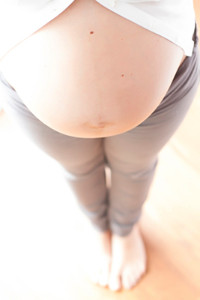 Pregnant women notice there are many changes that occur to their bodies, and these often include differences in the feet. Foot pain is a common complaint, and it may result from having flat feet. This happens to the feet as the mother-to-be gains weight from the growing fetus. Additionally, swollen feet is a common ailment among pregnant women, and this condition can produce severe discomfort. Mild relief may be found when the feet are elevated, and salt intake is reduced. Ingrown toenails may form during pregnancy, as a result of possible changes in the shape and size of the nail. It is important to moisturize the feet daily, as this often helps in preventing cracked heels from developing. If you would like additional information about how pregnancy affects the feet, it is suggested to consult with a podiatrist who can answer any questions you may have.
Pregnant women notice there are many changes that occur to their bodies, and these often include differences in the feet. Foot pain is a common complaint, and it may result from having flat feet. This happens to the feet as the mother-to-be gains weight from the growing fetus. Additionally, swollen feet is a common ailment among pregnant women, and this condition can produce severe discomfort. Mild relief may be found when the feet are elevated, and salt intake is reduced. Ingrown toenails may form during pregnancy, as a result of possible changes in the shape and size of the nail. It is important to moisturize the feet daily, as this often helps in preventing cracked heels from developing. If you would like additional information about how pregnancy affects the feet, it is suggested to consult with a podiatrist who can answer any questions you may have.
Pregnant women with swollen feet can be treated with a variety of different methods that are readily available. For more information about other cures for swollen feet during pregnancy, consult with Dr. Lee R. Stein from Lake Shore Foot & Ankle, PC. Our doctor will attend to all of your foot and ankle needs.
What Foot Problems Can Arise During Pregnancy?
One problem that can occur is overpronation, which occurs when the arch of the foot flattens and tends to roll inward. This can cause pain and discomfort in your heels while you’re walking or even just standing up, trying to support your baby.
Another problem is edema, or swelling in the extremities. This often affects the feet during pregnancy but tends to occur in the later stages.
How Can I Keep My Feet Healthy During Pregnancy?
- Wearing orthotics can provide extra support for the feet and help distribute weight evenly
- Minimize the amount of time spent walking barefoot
- Wear shoes with good arch support
- Wear shoes that allow for good circulation to the feet
- Elevate feet if you experience swelling
- Massage your feet
- Get regular, light exercise, such as walking, to promote blood circulation to the feet
If you have any questions please feel free to contact one of our offices located in Chicago, Highland Park, and Uptown, IL . We offer the newest diagnostic and treatment technologies for all your foot and ankle needs.
Blog Archives
- April 2025
- March 2025
- February 2025
- January 2025
- December 2024
- November 2024
- October 2024
- September 2024
- August 2024
- July 2024
- June 2024
- May 2024
- April 2024
- March 2024
- February 2024
- January 2024
- December 2023
- November 2023
- October 2023
- September 2023
- August 2023
- July 2023
- June 2023
- May 2023
- April 2023
- March 2023
- February 2023
- January 2023
- December 2022
- November 2022
- October 2022
- September 2022
- August 2022
- July 2022
- June 2022
- May 2022
- April 2022
- March 2022
- February 2022
- January 2022
- December 2021
- November 2021
- October 2021
- September 2021
- August 2021
- July 2021
- June 2021
- May 2021
- April 2021
- March 2021
- February 2021
- January 2021
- December 2020
- November 2020
- October 2020
- September 2020
- August 2020
- July 2020
- June 2020
- May 2020
- April 2020
- March 2020
- February 2020
- January 2020
- December 2019
- November 2019
- October 2019
- September 2019
- August 2019
- July 2019
- June 2019
- May 2019
- April 2019
- March 2019
- February 2019
- January 2019
- December 2018
- November 2018
- October 2018
- September 2018
- August 2018
- July 2018








